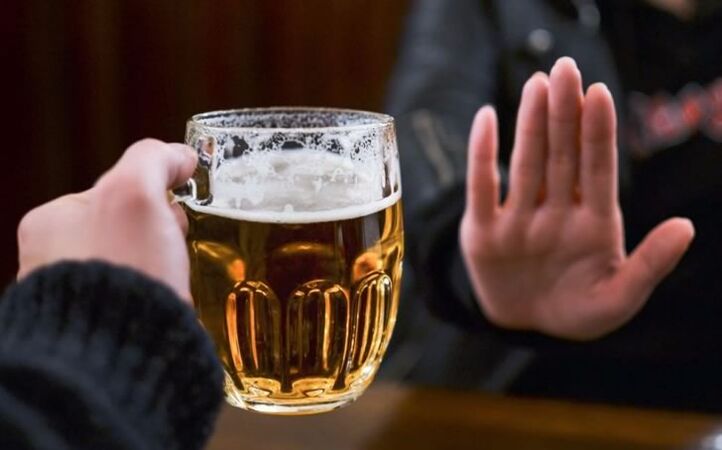Each person's health characteristics place limits on the consumption of certain foods and drinks.Some bans are temporary and some are permanent.
The most warnings relate to drinking alcohol, which can be dangerous even in moderation if you have a serious medical condition.
What to drink when losing weight
Being overweight is not a contraindication to drinking alcohol, so you should only be guided by dietary requirements.
If she allows light drinking, dry wine should be preferred.
White or red – it doesn’t matter as they have about the same calorie content (within 60-85 kcal/100 g) and very little sugar.
Strongly sweet drinks have the highest energy value, although it's not the calorie content that's important, but the ingredients.
When choosing between vodka and liqueur, whiskey and rum, original champagne or sparkling wine, preference should be given to the first of these.
These foods contain no sugar, whereas sugary drinks contain too much sugar.
Also important is the amount of snacks and alcohol.
A glass of wine with a block of cheese or 50 grams of brandy with a slice of lemon won't affect your waistline in any way, but a beer with nuts or a cocktail with rum will definitely not help with weight loss.
For diet lovers:
Only drink beverages with the lowest sugar and calorie content (dry wine, dry beer, lager, vodka, whiskey).
Dilute spirits with water and don't indulge in high-calorie snacks.
Drink in small amounts, in sips, over extended periods of time.
What to drink for gastritis
As with any stomach ailment, alcohol consumption should be avoided if possible, especially during the acute phase.
Alcohol can irritate the gastric mucosa and worsen the condition.
High-quality spirits are considered safest for gastritis: vodka, brandy, whiskey.
You can drink them in minimal doses with a full meal.Light table wine is allowed.
Any alcohol should be consumed with snacks, but not with greasy, spicy or salty dishes.
You should definitely avoid sparkling drinks (champagne, beer, sparkling wine), liqueurs and cocktails.
What can I drink if I have high blood pressure?
If you have high blood pressure, it is best to stop drinking alcohol, especially in the second and third stages of the disease.When the temperature is mild and the condition is stable, you can occasionally drink red wine - no more than 100 grams, 2-3 times a week.
What can you drink if you have diabetes?
People with this health disorder should be cautious about any food choices they make, including alcohol.
It is necessary to consider the glycemic index of foods and drinks.The higher it is, the more dangerous foods are for diabetics because they first increase blood sugar levels and then cause them to drop sharply.
Not recommended: Beer, liqueurs, cocktails, sherry, liqueurs, hard and carbonated products.
The following foods are allowed in small doses: desserts, dry white and red wine.
In order not to harm your health, you should also follow some tips:
Do not drink on an empty stomach or without a meal.You should eat snacks that contain slow-digesting carbohydrates (e.g., brown rice pilaf, rye bread).
It is necessary to monitor blood sugar levels every few hours.
Stop taking your medication when you drink alcohol (or better yet the day before) and stop taking your evening insulin injections if you are over the alcohol limit.You should also consult your doctor about these issues.
Avoid physical activity on the day you drink alcohol and ask loved ones to monitor your condition.
What can you drink if you have ulcers?
Medical experts have clearly answered this question: drinking alcohol is contraindicated with gastric ulcers.This prohibition is particularly important during the acute phase, when alcohol consumption is unacceptable.
Doctors do not recommend the consumption of alcoholic beverages during remission and after the ulcer has healed, which explains the limited possibility of recurrence.
What can you drink if you have gout?
In this case, doctors agree that it is unacceptable for patients with gout to drink alcohol.
There are several reasons for this ban:
Even small doses of alcohol can cause increased joint pain and circulatory and metabolic disorders.
Gout requires ongoing use of medications, and these medications are incompatible with alcohol.
Strong drinks can cause fluid retention and swelling in the tissues around joints, beer can dehydrate the body and increase the concentration of uric acid in the blood, and wine can increase the acidity of the urine.
What to drink for pancreatitis
If we consider that alcoholism is often the cause of pancreatitis, the answer is obvious.
If pancreatic dysfunction occurs, alcohol consumption is strictly prohibited.
Even small doses of ethanol can cause an attack.
This applies to any type of alcohol – both hard and low-alcohol drinks.
Furthermore, quality doesn't matter in this case: ethanol itself is dangerous.
The advice is general in nature - if you have any medical condition, you should pay attention to your condition and follow your doctor's guidance.
If you have any doubts about whether it's worth it, it's best to stop drinking altogether.































